This is an explanatory writeup of one of my Original Characters (OCs). Nothing here is necessarily related to a meaningful fiction you should recognise and is shared because I think my OCs are cool and it’s cool to talk about OCs you make.
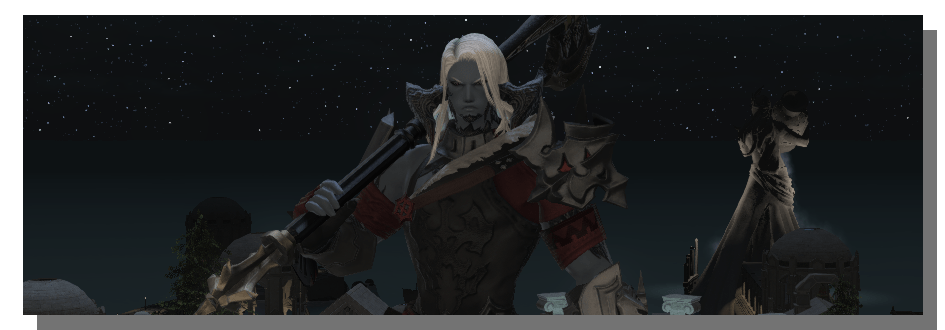
You might have met Karash Ejinn wandering around Limsa Lominsa, or perhaps out by Ul’dah, Idyllshire, or Radz-at-Han. It’s not like he doesn’t stand out – he’s the largest Au Ra you’ve ever seen, large even by their standards. If you’ve spoken to him, you’ll have heard the deep, rumbling voice, which speaks with a deliberate care in what is clearly his secondary language. While he’s obviously very dangerous — nobody his size would be seen as helpless — he seems to mostly do trade with people, bodyguarding work, and travel along riverways as a strange kind of nomad.
On the other hand, you might have met him on the battlefields, or in the trenches against the Garlean Empire over the past few years. You might have seen him, clad in black armour, repurposed from Garlean war machines, that made him seem even more massive and dark, as he walked through rivers of blood in an unflagging wall of violence pushing deep into the heart of the empire. You may have heard the rhyme the soldiers said about him.
It doesn’t think
It doesn’t feel
It doesn’t laugh or cry
All it does from dawn to dusk
Is make the soldiers die
There shouldn’t be anything that counts as a story spoiler below.
Karash is an Ejinn, of the Xaela clans of the Au Ra. The Ejinn are river nomads, who travel along the lands of the Azim Steppe and out to the Ruby Sea, and are known for being able to hold their breath for a long time – some people seem to think it’s half an hour, some think half a day. What I know is that Karash Can Swim To It – whatever it is, if it’s across water that can be crossed, Karash can get there. Extradimensional rifts will keep him out, so use those. Or have something he needs to take there, which won’t necessarily work.
If you know me at all you’ll know how much I love monstrous boys who are hot and nice, and Karash is in that tradition; when encountered ‘in the wild’ he’s literally a river monster – bursting out of the water, tearing apart his enemies, picking up what he can and then retreating into the water. It used to be that for a time, in the height of the war with the Garleans, he raided and plundered.
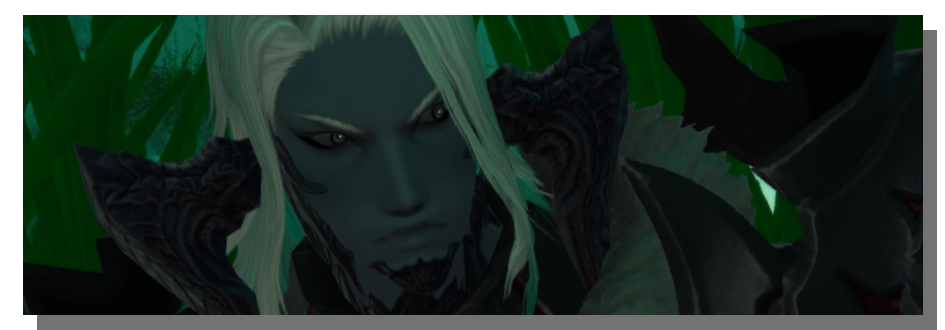
I see the Ejinn as a clan name with many tribes; that Karash is from a group of Ejinn, who lived by one set of rules in one location but it doesn’t mean any other Ejinn have to expect that of him. After all, a lot of it is stuff you’d never bother talking about in most situations. Things like how people outside of the Ejinn use weird words to refer to types of Au Ra, assuming all small dainty ones are female and all tall heavy ones are male – even if that’s a common trend, he’d say, it’s not a rule. After all, what size would you expect a nonbinary Ejinn to be?
Karash speaking in his second language is important to how I play him. There are some words he wants from his first language that are missing in the common tongue. He has an incredible sense of taste, which he considers typical, and the terminology he uses to refer to water represents a variety of specific details – drinks are often framed in how they compare, in flavour, to water. Coffee, for example, he described as ‘bitter water that doesn’t want to be drunk.’ That wasn’t a complaint, though.
Karash is patient and decisive. A lot of the time, with other people, he will listen to everything, wait until he thinks he understands the situation, and then his action will be incredibly decisive, even brutal or shocking. Jumping from ‘nothing is happening to ‘suddenly the Ejinn is moving and we have to keep up’ is a big part of the Karash experience. He doesn’t flinch from protecting people and he is just as decisive about dealing with tyrants.
A small thing about his design I really like is that he is wearing lipstick and eyeshadow – things that emphasise his expression. The actual powder he uses for that is meant to glow in the dark, so when stalking enemies at night, or doing raids, he could take off a wooden mask and reveal the terrifying glowing mask he wears. I like this so much, in part because I picked the colours I did on his face at first to just give his face some texture in character creation, but a friend pointed out that he looked so pouty, because his lips glistened. That led to the question of ‘does Karash wear makeup?’ and the answer I came up with results in horrifying ghost faces from the dark surrounding jagged glowing teeth, so yeah. That sounds sick.
Mechanics
Karash is, first and foremost a Warrior. The Warrior role quests in Final Fantasy XIV gets some strange ideas about what it means to ‘be a warrior’ – there’s talk about channelling the earth or an inner beast, and there’s some mysticism about blood magic, but no, none of that applies. Karash is a flesh-and-blood warrior whose powers stem from being bigger and stronger than most everyone he’s met, whose physical force is, as far as he knows, unparallelled around him, and whose will is absolutely unshakeable.
Karash’s impossible survivability, and the way that he has punched through targets that are meant to be untouchable is a deliberately ambiguous point: You can imagine he’s magically empowered, tempered by his own will, an actual eikon created by the spirit of his own people, or some lovecraftian horror, whatever makes the most sense to you. Or maybe he’s just an example of what an absolute single-minded focus for an absolute devotion to the task of murdering an empire can do to a person.
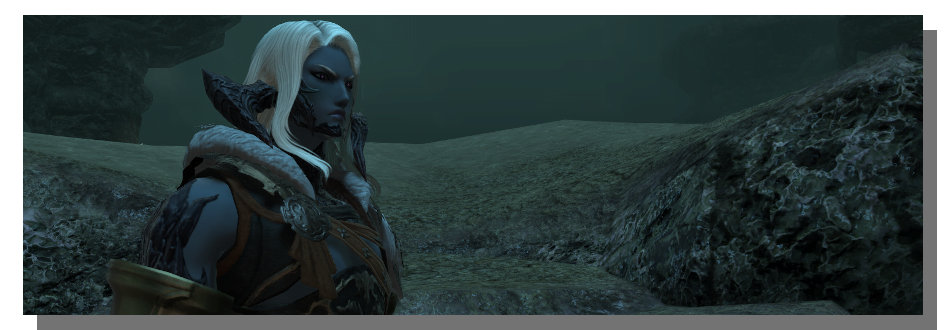
I gave him two other classes; he’s a Samurai for melee DPS, which was one of a small number of options for characters that look like they’re using strength to drive a large, heavy weapon. There’s a bit of a visual flaminess to the Samurai though that makes it hard to eschew, so I tried to tie the Samurai back to invoking the Viqqoh of his childhood area, and his friend who’s tied to the power of Ifrit.
I use the White Mage for his healing class, which, in-character, is mostly a way to represent ways he makes promises and pledges to spirits to do a sort of spiritualistic magic. Karash isn’t a spellcaster, but I can imagine him sitting down in an area, doing a little ritual and talking to the spirit of the area, seeing what they want, and doing something for them in order to do something like change the flow of a river, heal a friend, or unwend a curse. That’s a trick that he then ties to pledges – things like ‘sorry, I can’t pick up my weapon today, I promised a spirit,’ – that can put boundaries on what he’s doing.
Oh, and Karash has levels of fisher and an accidentally obtained level of I think, Blacksmith.
By the way, the amount of work I have to do to make this section interesting, because if I were to talk about Karash as I do my City of Heroes characters, it would be one sentence: Final Fantasy XIV characters are extremely dull to consider as mechanical objects, because you don’t make choices, so Karash is a Warrior, like all the other Warriors.
Place In The World
If you’re familiar at all with the name Karash, you’ll know that that’s not a name. If you’ve done the Warrior Quests, you might even notice that the name is something that the game lore treats as a curse that afflicts warriors. I did not know this when I named him, and I’m honestly very happy to find that. Point is, though, Karash isn’t a name. Karash isn’t the name he was born with, either.
Karash grew up with his clan, roaming up and down the One River in the jungles of Othard. Growing up his clan was nomadic, and piratical; they would raid Garlean barges and steal from them, often killing the soldiers on the way. A number of things they raided for were useless to them – what good is a field forge if you have to carry it everywhere – so they traded things like heavy armour and mecha parts to the Viqqoh, a tribe of Miqo’te in the area.
When Karash’s people saw the encroachment of the Garlean Empire, and when they acknowledged the existential threat posed by them, they had a great Meet to decide what to do. Many days of consideration concluded with the idea that the shamans and sages of the clan would put a curse on the Garlean empire, a curse that would kill it.
The people agreed.
Karash has never told people the specifics of what happens next; either he was called for by the shamans, or he volunteered, or a spirit demanded him, but whatever the reason, he was the one chosen. He was not the one to deliver the curse, not the one to carry it: he was the curse. Stripped of his name, his identity, his family, Karash walked away from his home, and made his entire life about destroying the Garlean Empire, in every way he could.
The warfront, when he found it, came with confusion and loss. It wasn’t the danger from the Garleans – no, that made sense, that he understood. What he was, however, was green, completely unaware of the scale of the problem, or the scope of the empire. A friend found him, someone with a common point of heritage, and taught him how to speak common languages, and the scale and scope of the Empire… and all that did was redouble his drive to destroy the Empire, one head at a time.
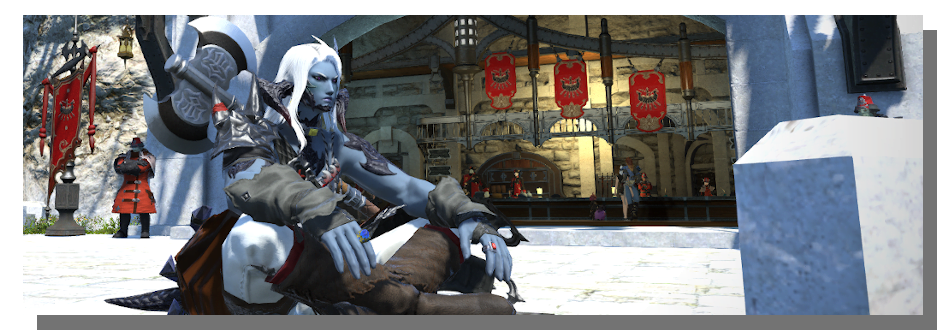
It’s hard for me to imagine what it means for Karash to be the Warrior of Light. The character presented by the game is extremely passive, and is meant to be emotionally affected by a lot of things that I don’t think would really bother him. The biggest thing that’s ‘Warrior of Lighty’ that seems to me to be important would be going to the First.
The First is the thing I’d miss. I like the world of Shadowbringers, with its horrors of burning light. Karash’s defining aesthetic is that he’s a river monster, so a world where people can see a river monster set against a force of angels feels good to me.
If he was the Warrior of Light, I know that he’d not have the Echo. Oh, sure, people would assume he was Azem’s reincarnation and that that meant something, but consistently they’d find that any time they tried to use mystic divination to find that, no, it wasn’t true. He’s not the reincarnation of anyone or blessed by a god in any way. Karash is the way he is because of the belief of his people, because he gave up his name, because the will to act in the face of evil is itself something strong enough, if you can believe in it enough.
Of course, with the language barrier, this Karash would hear people sharing theories about him and his special importance and just blink and nod and let them say what they want to, because he doesn’t understand them perfectly, so who is he to say if they are right. What he does know is that when he faces the unjust, he will fight it.
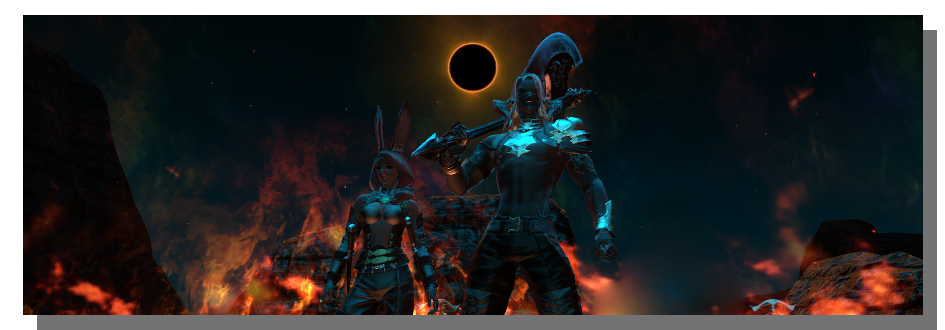
This is partly because I like playing with the idea that Karash being a curse makes him something strange to most forms of magic. I also think it’s because tempering is really stupid, and the Echo is an equally stupid idea. Congratulations, you can have mild flashbacks, which will never give you information you can act on, because that would require giving you agency.
Karash can be the centre of a conspiracy theory from dozens of important people, but in any given story, I think he’s just focused on what matters to him: Killing empires, and those who make empires. I think about how he’d react to a lot of the scenarios presented to him in the Main Scenario Quest and kinda laugh.
It’s actually a minor point that, once, when I played Karash, my original plan was that any time someone brought up ‘The Warrior of Light,’ he was going to name a specific character and say ‘oh yeah, her, she’s famous.’ And it wasn’t someone he knew, just someone I, out of character, know plays their character as if she is the Warrior of Light.